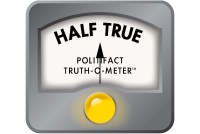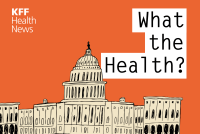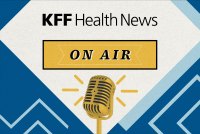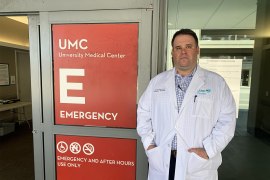Latest KFF Health News Stories
A More Aggressive FTC Is Starting to Target Drug Mergers and Industry Middlemen
Industry analysts are skeptical that Federal Trade Commission Chair Lina Khan can win her first fight against a drug industry merger. It will be reviewed by a judge appointed by then-President Donald Trump.
La Comisión Federal de Comercio está actuando contra las empresas farmacéuticas y los intermediarios del sector, como parte de la campaña de la administración Biden para reducir los precios de los medicamentos en las farmacias.
Are US Prescription Drug Prices 10 Times Those of Other Nations? Only Sometimes
Sen. Bernie Sanders’ broad statement that some U.S. drug prices are 10 times those of other nations doesn’t paint the full picture. Studies we examined generally found that U.S. prices were two to four times those in other countries, not 10.
A Rural County’s Choice: Use Opioid Funds to Pay Off Debt, or Pay Them Forward to Curb Crisis
Greene County, Tennessee, so far has received more than $2.7 million from regional and national settlements with opioid manufacturers and distributors. But most of the money is not going to help people and families harmed by addiction.
KFF Health News' 'What the Health?': The Crisis Is Officially Ending, but Covid Confusion Lives On
The public health emergency declaration for covid-19 ends May 11, ushering in major changes in how Americans can access and pay for the vaccines, treatments, and tests particular to the culprit coronavirus. But not everyone will experience the same changes, creating a confusing patchwork of coverage — not unlike health coverage for other diseases. Meanwhile, outside advisers to the FDA formally recommended allowing a birth control pill to be sold without a prescription. If the FDA follows the recommendation, it would represent the first over-the-counter form of hormonal contraception. Margot Sanger-Katz of The New York Times, Tami Luhby of CNN, and Joanne Kenen of the Johns Hopkins Bloomberg School of Public Health and Politico join KFF Health News’ Julie Rovner to discuss these issues and more. Plus for “extra credit” the panelists suggest health policy stories they read this week they think you should read, too.
PBMs, the Brokers Who Control Drug Prices, Finally Get Washington’s Attention
Drugmakers, pharmacies, and physicians blame pharmacy benefit managers for high drug prices. Congress is finally on board, too, but will it matter?
California Confronts Overdose Epidemic Among Former Prison Inmates
Individuals newly released from prison are 40 times as likely to die of opioid overdoses than members of the general population, researchers say. In response, California corrections officials aim to arm departing inmates with an antidote that can be used to reverse the effects of opioid poisoning.
Colorado Becomes the First State to Ban So-Called Abortion Pill Reversals
The controversial practice of administering progesterone to people after they have taken the abortion pill mifepristone may be coming to an end in Colorado. Pills have emerged as the latest front in the war over abortion since the U.S. Supreme Court overturned Roe v. Wade last summer.
Listen: How Are States Spending Money From the Opioid Settlements? It’s Not Easy to Know
KFF Health News senior correspondent Aneri Pattani appeared on NPR’s “1A” on May 1 to discuss issues related to how opioid settlement funds are being distributed.
El dolor, la esperanza y la ciencia chocan cuando los atletas recurren a los hongos mágicos
El uso de hongos psicodélicos está ganando terreno en los Estados Unidos. Investigadores predicen que la FDA aprobará un tratamiento psicodélico en los próximos cinco años.
Listen: Mifepristone Remains Available for Now. What Happens Next?
The Supreme Court on April 21 ruled that the abortion pill mifepristone should remain widely available while the lower courts consider the issue, blocking earlier rulings that banned or restricted access to the drug. KFF Health News’ Julie Rovner joined NPR’s “Weekend All Things Considered” to discuss the complicated case.
Pain, Hope, and Science Collide as Athletes Turn to Magic Mushrooms
A group of former professional athletes traveled to Jamaica to try psychedelics as a way to help cope with the aftereffects of concussions and a career of body-pounding injuries. Will this still largely untested treatment work?
The Biden Administration Vowed to Be a Leading Voice on Opioid Settlements But Has Gone Quiet
Billions of dollars are headed to state and local governments to address the opioid crisis. Policy experts and advocates expect the federal government to play a role in overseeing the use of the money. Failure to do so, they say, could lead to wasted opportunities. And, since Medicaid helps pay health care costs, the feds could have a claim to portions of states’ opioid settlements.
KFF Health News' 'What the Health?': Will They or Won’t They (Block the Abortion Pill)?
The Supreme Court is considering the future of the abortion pill mifepristone, after GenBioPro sued the FDA over limitations that effectively block generic production of the drug, a major part of the market. Congress is considering proposals that would impose Medicaid work requirements, crack down on pharmacy benefit managers, and more. And President Joe Biden moved to expand health coverage to young immigrants known as “Dreamers.” Rachel Cohrs of Stat, Sandhya Raman of CQ Roll Call, and Joanne Kenen of the Johns Hopkins Bloomberg School of Public Health and Politico join KFF Health News’ Mary Agnes Carey to discuss these issues and more.
Redes sociales alimentan obsesión por las drogas para bajar de peso, sin hablar de riesgos
La competencia para hacerse con un mercado que podría valer $100.000 millones al año, solo para los fabricantes de medicamentos, ha desencadenado una ola de publicidad que preocupa a las autoridades sanitarias y médicos de todo el mundo.
Social Media Is Fueling Enthusiasm for New Weight Loss Drugs. Are Regulators Watching?
Online platforms are overflowing with testimonials for GLP-1s. The drugs show promise for inducing weight loss, but many aren’t FDA-approved for that use.
Journalists Track Opioid Settlement Cash and Fees for Telehealth Visits
KFF Health News and California Healthline staff made the rounds on national and local media this week to discuss their stories. Here’s a collection of their appearances.
La empresa farmacéutica que prosperó sin crear ni un solo medicamento
Aunque Horizon afirma que ahora tiene 20 fármacos en desarrollo, en sus 15 años de existencia aún no ha obtenido la licencia de un producto de su creación.
KFF Health News' 'What the Health?': The Confusing Fate of the Abortion Pill
The legality and availability of the abortion pill mifepristone is in question after a federal judge in Texas canceled the FDA’s approval of the first drug used in the two-drug medication abortion regimen. A 5th Circuit Court of Appeals panel overruled that decision in part, saying the pill should remain available, but only under the onerous restrictions in place before 2016. Meanwhile, another federal judge in Washington state issued a ruling in a separate case that conflicts with the Texas decision, ordering the FDA not to roll back any of its restrictions on the drug. Victoria Knight of Axios, Shefali Luthra of The 19th, and Sarah Karlin-Smith of the Pink Sheet join KFF Health News chief Washington correspondent Julie Rovner to discuss these issues and more.
The Drug Company That Prospered Without Creating Any Drugs
Horizon Therapeutics, which Amgen is acquiring for about $28 billion, grew large by snapping up cheap drugs from other companies, marketing them to perfection, and jacking up prices.


















